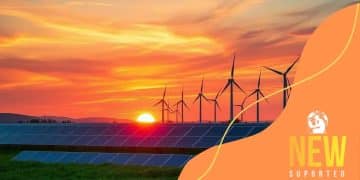How technology is solving global water shortages

How technology is solving global water shortages involves advanced methods like AI for water management, desalination, smart irrigation, and water recycling, ensuring sustainable and efficient use of valuable resources.
How technology is solving global water shortages is a pressing topic as we face unprecedented challenges in water access. Have you considered how innovative solutions are emerging to tackle this crisis? In this article, we’ll dive into some fascinating technologies that may reshape our water future.
Innovative water purification technologies
Innovative water purification technologies are crucial in addressing the global water crisis. These advancements help ensure that everyone has access to clean and safe drinking water. Several methods are revolutionizing how we purify water, making it more efficient and sustainable.
Types of Innovative Technologies
Many different strategies are being used to purify water effectively. Let’s explore some of the most promising technologies:
- Reverse osmosis: This method forces water through a semipermeable membrane, removing impurities and contaminants.
- UV disinfection: Ultraviolet light is used to kill harmful bacteria and viruses, making water safe to drink.
- Membrane filtration: This technique separates particles from water using specialized membranes, ensuring high-quality purification.
- Biofiltration: This natural method utilizes living organisms to filter and purify water, making it environmentally friendly.
Research shows that these technologies are becoming more accessible and cost-effective. For example, the use of solar energy in water purification systems is on the rise. This not only reduces costs but also minimizes environmental impact. By harnessing renewable energy, communities can enhance their resilience against water shortages.
In addition to advanced filtering and disinfection technologies, ongoing research is focusing on improving the materials used in these systems. New materials can enhance efficiency, making purification processes quicker and more effective. These innovations hold great promise for areas suffering from acute water scarcity.
Future Impact
As we look toward the future, the potential of innovative water purification technologies continues to grow. Adopting these solutions can lead to significant improvements in water availability and quality globally. It’s essential to support investments in research and development, ensuring that these technologies reach the most affected areas promptly.
In conclusion, addressing global water shortages requires embracing innovative water purification technologies. As they become more refined and widespread, they hold the key to a cleaner and more sustainable future for everyone.
Smart irrigation systems in agriculture
Smart irrigation systems in agriculture are transforming how farmers manage water resources. These systems utilize advanced technology to optimize watering schedules, ensuring that crops receive the precise amount of water they need.
Benefits of Smart Irrigation
Farmers benefit significantly from adopting these systems. Here are some of the key advantages:
- Water conservation: Smart irrigation minimizes water waste by using data to determine the exact needs of crops.
- Increased crop yield: With precise watering, plants grow healthier and can produce higher yields.
- Cost savings: Reduced water usage leads to lower utility bills for farmers, increasing their profitability.
- Environmental impact: Efficient water use contributes to sustainability and preserves local ecosystems.
These systems often use sensors and weather data to automate irrigation. For instance, soil moisture sensors can detect when soil is dry and trigger watering systems, while weather forecasts can help adjust schedules to avoid overwatering during rainy periods. This responsiveness is key to modern agricultural practices.
Moreover, smart irrigation technologies come in several forms. Drip irrigation systems, for example, deliver water directly to the roots of plants. This targeted approach further reduces water waste. Some systems even integrate with mobile apps, allowing farmers to monitor and adjust irrigation from their smartphones. The ease and flexibility provided by these technologies empower farmers to make informed decisions effortlessly.
Adoption Trends
As water scarcity becomes a larger issue, we can expect to see a shift toward smart irrigation systems more widely. Governments and agricultural organizations are starting to promote these technologies through grants and education. By investing in training and resources, they aim to equip farmers with the knowledge needed to adopt these systems effectively.
Ultimately, smart irrigation systems in agriculture are essential for sustainability in food production. They represent a step towards more responsible resource management while enhancing productivity on farms worldwide.
Desalination advances and their impact

Desalination advances are becoming vital in solving the global water crisis. With a growing population and climate change putting pressure on freshwater resources, these innovations are offering a lifeline.
Understanding Desalination Technology
Desalination involves removing salt and impurities from seawater to make it suitable for drinking and irrigation. Recent advancements have improved the efficiency and cost-effectiveness of this process.
- Reverse osmosis: This is one of the most common methods used. It utilizes a membrane to separate salt from water, making the process cleaner and more efficient than ever.
- Solar desalination: By harnessing solar energy, this method reduces operational costs and environmental impacts while providing freshwater.
- Electrodialysis: This innovative approach uses electricity to move ions across membranes, allowing for a faster desalination process.
- Waste heat utilization: Using excess heat from power plants can enhance desalination efficiency, turning waste into a valuable resource.
These technologies not only improve water quality but also expand access to freshwater in arid regions. Countries with limited natural water sources, like Saudi Arabia and the United Arab Emirates, have turned to desalination as a mainstay of their water supply. This shift has led to significant economic benefits and enhanced food production by making agricultural irrigation more reliable.
Furthermore, advances in desalination technology are addressing environmental concerns. Newer systems are designed to minimize the impact on marine ecosystems. For instance, intake systems that reduce marine life entrainment help protect aquatic habitats while still providing vital resources.
The Future of Desalination
As we look ahead, the role of desalination in global water supply is expected to grow. Innovations in materials and processes will likely lead to even greater efficiencies and lower costs. Investing in research and development will be critical for unlocking the full potential of desalination.
In cities facing severe water shortages, desalination may become a primary means of securing clean water for residents. By making desalination advances a priority, we can take meaningful steps toward ensuring a stable and sustainable water future for all.
Water recycling and conservation methods
Water recycling and conservation methods are essential for sustainable water management. As fresh water becomes increasingly scarce, these techniques help ensure that we use our water resources more efficiently.
What is Water Recycling?
Water recycling involves treating wastewater so it can be reused for various purposes. This process is vital in urban areas where water demand often exceeds supply. Recycled water can be used for irrigation, industrial processes, or even for drinking after proper treatment.
- Greywater recycling: This involves repurposing water from sinks, showers, and laundry for irrigation or toilet flushing.
- Advanced filtration: Technologies like microfiltration and reverse osmosis improve water quality by removing contaminants before reuse.
- Rainwater harvesting: Collecting and storing rainwater can reduce reliance on municipal water systems, providing an additional source of water.
- On-site treatment systems: Individual systems can treat and recycle water efficiently, particularly in rural areas.
In addition to recycling, conservation methods are equally crucial. Simple changes in behavior can significantly reduce water use. For example, installing low-flow fixtures, fixing leaks promptly, and practicing mindful watering in gardens can contribute to effective conservation.
Conservation also involves educating communities about the importance of saving water. Campaigns that promote awareness can lead to changes in daily habits, resulting in substantial water savings over time. For instance, using a broom instead of a hose to clean driveways helps conserve valuable water resources.
Impact on Water Sustainability
Implementing water recycling and conservation methods leads to a more sustainable future. Cities that embrace these techniques not only address water shortages but also reduce wastewater treatment costs. This dual benefit is crucial as populations grow and demand for fresh water increases.
In conclusion, adopting effective water recycling and conservation methods is essential in our effort to promote sustainable water management practices. With continued innovation and awareness, we can secure a reliable water supply for future generations.
The role of AI in water management
The role of AI in water management is becoming increasingly important as we face global water challenges. Through sophisticated algorithms and data analysis, AI helps optimize water use, ensuring sustainability and efficiency.
Applications of AI in Water Management
AI technology can be applied in various areas of water management to enhance performance and reduce waste. Here are some significant applications:
- Predictive analytics: AI can analyze historical water usage data to forecast future demands, allowing for better resource planning.
- Leak detection: Using machine learning algorithms, AI systems can identify leaks in pipelines by monitoring pressure changes.
- Smart irrigation: AI optimizes irrigation schedules based on weather forecasts and soil moisture levels, preventing overwatering and conserving water.
- Water quality monitoring: AI systems can analyze data from sensors placed in water bodies to detect contaminants and ensure water safety.
With these technologies in place, cities can manage their water resources more effectively. For instance, by implementing AI systems, municipalities can adjust water distribution in real-time, responding to fluctuations in demand and prioritizing conservation efforts as needed.
Furthermore, AI helps in decision-making processes. By processing vast amounts of environmental data, AI can provide insights for policymakers, helping them implement strategies that promote water efficiency. The technology can also model the impact of climate change on water supplies, allowing for proactive measures before shortages occur.
Future of AI in Water Management
Looking ahead, the integration of AI in water management is expected to expand. Advances in computer vision and machine learning will enhance the capabilities of existing systems. Moreover, as more IoT devices are deployed, the volume of data available for analysis will grow, improving AI algorithms over time.
The benefits of leveraging AI in water management are clear. By using these technologies, we can reduce waste, protect our water resources, and meet the growing needs of our communities. AI represents a significant step toward more sustainable water management practices globally.
Conclusion
In conclusion, addressing global water shortages requires a combination of innovative technologies and sustainable practices. Advancements in areas such as AI, desalination, and smart irrigation offer effective solutions to ensure efficient water use. By embracing water recycling and conservation methods, we can protect this vital resource for future generations. Collective action and commitment to these strategies will lead us toward a more sustainable and secure water future for all.
FAQ – Frequently Asked Questions about Water Management Technologies
What is water recycling?
Water recycling involves treating wastewater to make it reusable for irrigation and other purposes, conserving fresh water.
How does AI help in water management?
AI optimizes water use by analyzing data, predicting demand, detecting leaks, and managing irrigation schedules effectively.
What are the benefits of smart irrigation systems?
Smart irrigation systems save water by adjusting watering schedules based on real-time weather data and soil moisture levels.
Why is desalination important?
Desalination is crucial for converting seawater into fresh water, offering a reliable source of drinking water in areas with limited freshwater resources.






